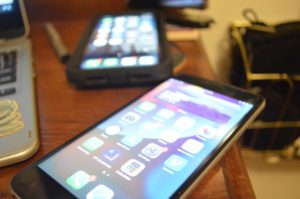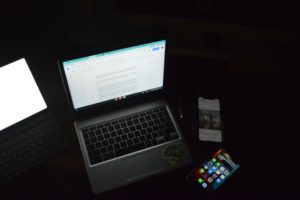Digital dementia is one of tech’s newest downsides. As smartphones become ubiquitous and dominate our lives, they’re also taking a serious toll on our brain’s functionality.
But if tech overuse can degrade our brains, it stands to reason that our brains can rebound, too.
It’s just a matter of knowing the most effective brain-boosting strategies.

Three weeks ago, I wrote an article for this very publication about cobalt mining. And yet, when I tried to retrieve the word cobalt from memory yesterday, I couldn’t do it. The word lithium came easily. So did the word batteries. I knew I was looking for the name of a raw mineral used in our tech devices. But the exact word sat on the tip of my tongue for a good 30 seconds before I finally recalled it.
This blip in my otherwise decent memory could’ve just been a hiccup. I work a lot, so maybe I was just tired at the time. However, I’d also recently heard about a condition known as “digital dementia,” and with my increased use of tech and social media in the last six months, I wondered if this lapse was a symptom.

What is Digital Dementia?
Symptoms
Coined by neuroscientist Manfred Spitzer in 2012, digital dementia is characterized by a shortened attention span, memory loss, and developmental delays. For children and adolescents, the latter concern is especially pronounced. As kids become more reliant on tech devices, they’re at greater risk for digital dementia. Some health organizations warn that there’s an epidemic of digital dementia on the horizon.
The condition is also associated with anger, depression, and anxiety. If our devices make up the bulk of our social life, we’re likely to become isolated. Digital dementia also coincides with certain balance disorders, owing to over-absorption in gaming screens.
It’s always seemed obvious that holing up with a bright, busy screen in my dark bedroom could be a bad habit (albeit one I still indulge in at times). But I was still curious about the neurological mechanisms: Why does the brain’s functionality degrade due to the use of the smartphone?

Your Brain is a Muscle, and the Smartphone Weakens it
In the simplest terms: We’ve begun outsourcing our brain’s work to our smartphones.
If you’re of a certain age—say 30 or older—you likely remember a time before cell phones. Back then, we had to rely on our own memories to store unique phone numbers for all our friends. Even now, I can recall friends’ numbers from high school, and that was over 15 years ago.
Today, I don’t even have my roommates’ numbers memorized. Instead of dialing our loved ones’ numbers when we want to call, we type it in once and hit “save to contacts.” Because of this, our brains are doing less work. The result is that they atrophy and digital dementia takes hold. We also don’t give ourselves a chance to remember anything. I, for one, have a tendency to look things up at the first sign of not knowing.
Similarly, though it’s tempting to “skim” online content, this usually means that we take in a huge volume of shallowly absorbed material. Today, our attention flits around from one app, one tab, and one article to another. In this way, we rarely flex the sustained concentration muscle required to absorb what we read.
Imbalance of the brain
One NIH study also discovered that smartphones primarily stimulate the left side of the brain. Meanwhile, the right side of the brain—associated with concentration and focus—remains deactivated. Over time, the brain becomes imbalanced. The areas responsible for good cognition weaken.
Part of the problem also lies in the posture we assume when staring at a device: Upper vertebrae tilted forward, neck craning down. In this position, we can enter a state known as sensory disassociation, wherein the front part of the brain is highly activated while the back isn’t activated at all.
These factors create the perfect storm for digital dementia. Without taking steps to actively address it—just like with average dementia—the problem tends to worsen.

How to Fight Digital Dementia
The solutions are simple, but take effort to put into practice: Rely less on tech.
- One easy way is to go back to the way you dialed before every number was under “contacts.” It may feel like a waste of time or like there’s no point in doing this. But if we can take a little time and type in people’s whole numbers again, we can gradually relearn how to hold multiple phone numbers in mind. This retrains our capacity to store memories overall.
- Do math equations by hand. This tip is obviously most useful for students or people in math-heavy jobs, but the concept is similar. Rather than depending on a calculator, do whichever problems you can by hand before plugging them into a computer.
- Read books. The advantage of books is not just that they come without the eye-straining blue light and tiny print that forces us to lean forward and scroll. Books are focused documents. They encourage us to stay on task just by virtue of being the only thing our attention is on.
- Resist the urge to look everything up. Even if you’re having a hard time remembering a fact or a song lyrics, sit there with your not-knowing. You might be surprised that the information you’re looking for pops into your mind unexpectedly. Let your own recall do a little heavy lifting, give the phone a break, and watch your memory rebound.
- Learn a new language and/or engage in other concentration-building tasks. Learning a new language is a great way to stave off deteriorating cognition, digital dementia or otherwise. Activities like sudoku and crosswords also help. Interestingly, neuroscience also recommends these activities to older people at risk for traditional dementia.
At first glance, these tactics might seem too negligible to make a difference. But when it comes to your precious brain’s capacity to store information and function properly?
I think every little bit is worth it.
Get more like this—Sign up for our daily inspirational newsletter for exclusive content!
___
Photo: Pixabay; Veex




